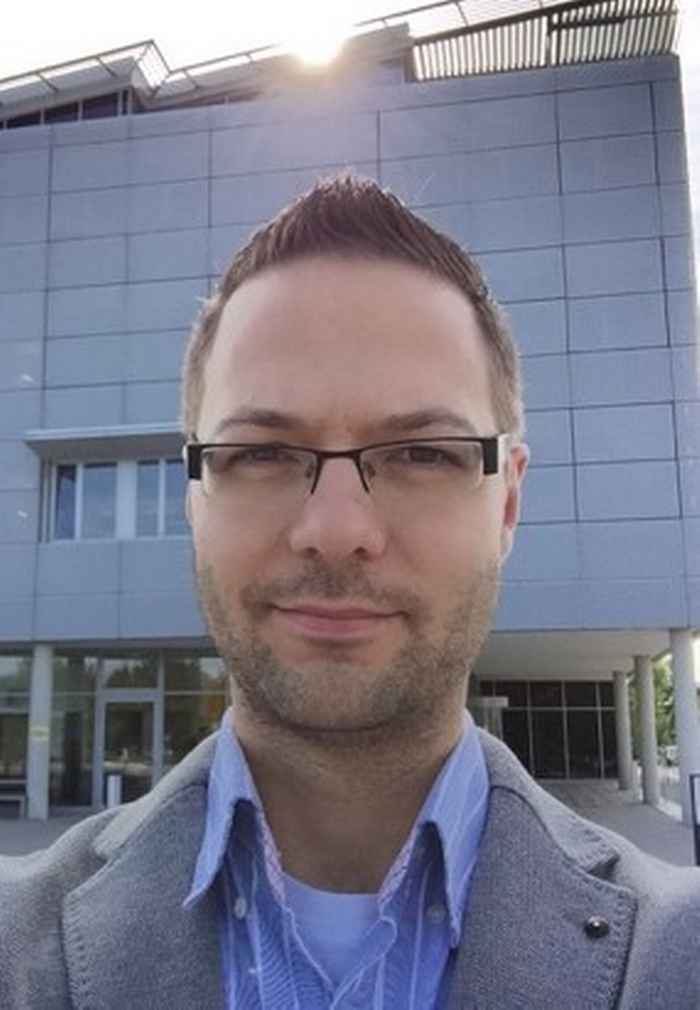Wall-less fluidics: principles and applications
- Date
- 30 November 2023
- Time
- 13:30
Venue
Science Park 904, room L1.02
Contact
Abstract
Fluidic circuits are hampered by solid wall interactions, leading to excessive pressure drop for small channels, solute adhesion, and fouling. In addition, handling solids in < 1 mm microfluidic channels is nearly impossible. Recently, we have developed fluidic channels that have a liquid wall by stabilizing oily ferrofluids in a 3D-designed magnetic field using cheap NdFeB magnets.1 The resulting channels and devices are stable2, uncloggable1, and (close to) frictionless3. Common fluidic operations such as valving, mixing, and ‘magnetostaltic’ pumping can be achieved by moving permanent magnets without physical contact with the tubes. Applications in low-shear pumping, mixing, and flow chemistry will be presented.
1. Dunne, P. et al. Liquid flow and control without solid walls. Nature 581, 58–62 (2020).
2. Dev, A. A., Hermans, T. & Doudin, B. Suppressing Rayleigh-Plateau Instability with a Magnetic Force Field for Deformable Interfaces Engineering. Preprint at http://arxiv.org/abs/2310.14280 (2023).
3. Dev, A. A., Dunne, P., Hermans, T. M. & Doudin, B. Fluid Drag Reduction by Magnetic Confinement. Langmuir 38, 719–726 (2022).
CV
Thomas Hermans is Professor of Chemistry (1st class) at the University of Strasbourg and group leader of the Laboratory of Nonequilibrium Complex Systems (www.hermanslab.com). He studied Chemical Engineering and Chemistry at the Eindhoven University of Technology (2000-2006), followed by a PhD at the faculty of Biomedical Engineering under the supervision of Prof. E.W. (Bert) Meijer (2006-2010). Next, he joined the group of Prof. Bartosz Grzybowski at Northwestern University as a postdoctoral fellow (2010-2013).
Recent distinctions include: Prix Guy Ourrison (2018), ERC Starting grant (2018), World Economic Forum (“young scientist” 2019)[1], IUPAC Periodic Table of Younger Chemists (element “Francium” (2019), Mercator fellow (DFG, 2020), i-Lab ‘Grand Prix’ with start-up Qfluidics (highest French start-up prize, 2020), Prix Forscheurs Jean-Marie Lehn (2022), Prix Christiane Dietrich-Buchecker (2022), Institut Universitaire de France – Junior chair (2022), ERC Consolidator grant (2023), The Netherlands Scholar Award for Supramolecular Chemistry (2023).
The main goal of the research group is obtaining adaptive, self-healing, self-replicating and ultimately living materials using molecular self-assembly under far-from-equilibrium conditions. Prof. Hermans is also co-founder and CSO of Qfluidics, a company working on wall-less fluidics for flow chemistry and low-shear magnetostaltic pumping for transport of delicate biologicals.
[1] https://www.weforum.org/press/2019/06/unveiled-the-brightest-young-scientific-minds-in-the-world/
